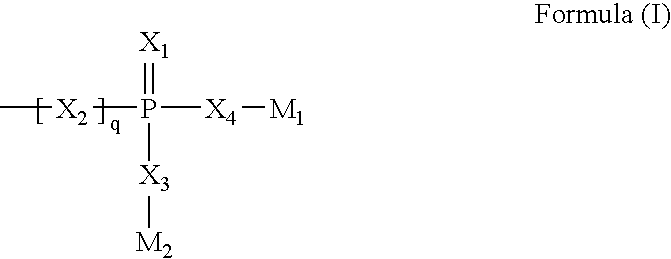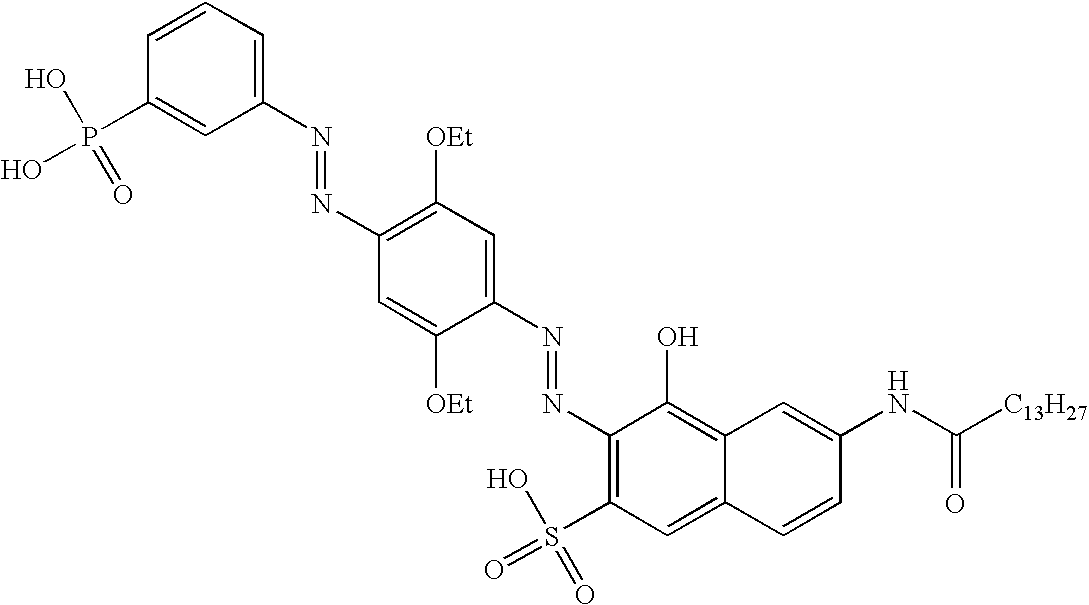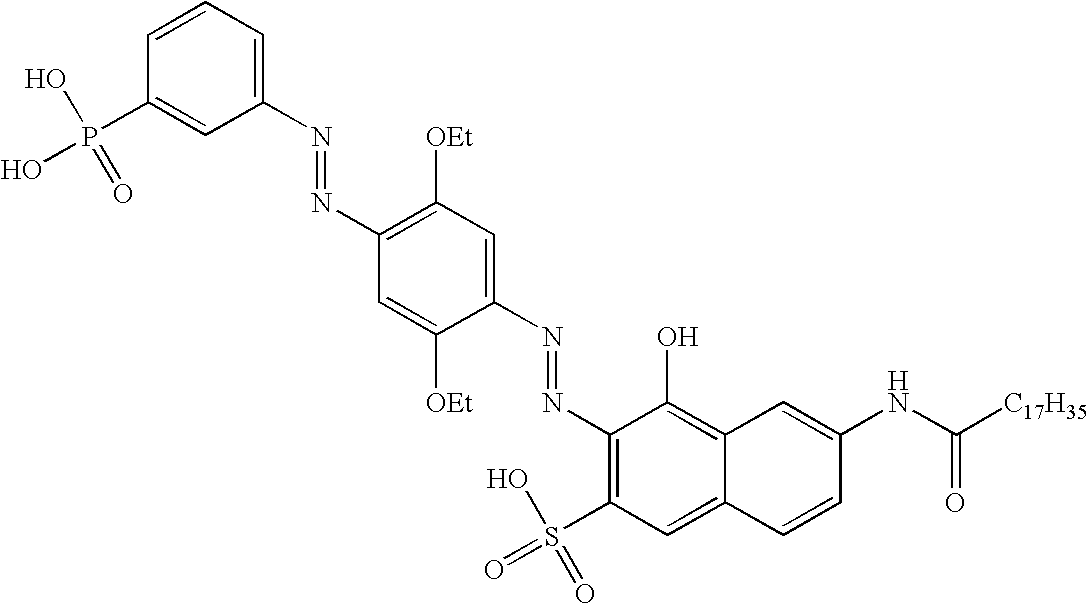Contrast Dyes for Inkjet Lithographic Printing Plates
- Summary
- Abstract
- Description
- Claims
- Application Information
AI Technical Summary
Benefits of technology
Problems solved by technology
Method used
Image
Examples
example 1
[0179]This example describes the synthesis of contrast dye CD-1 and CD-2.
[0180]The starting black blue dye was prepared according to Example A of EP 0771860 A (SEIKO EPSON).
[0181]5 g of the starting black blue dye (8 mmol) was dissolved in 30 mL dimethyl acetamide. Then 1.4 mL (9.7 mmol) triethylamine was added. 2.8 g (11.3 mmol) of myristoyl chloride was added dropwise to the reaction mixture. The reaction was allowed to continue for 1 hour at room temperature. Contrast dye CD-1 partially precipitated from the medium, was isolated by filtration and washed with a small amount of dimethyl acetamide and ethylacetate. The filtrate was diluted with 300 mL ethyl acetate and a second fraction of contrast dye 1 precipitated. The second fraction was isolated by filtration and washed several times with 50 mL ethyl acetate. The pooled fractions were dried under vacuum.
[0182]Contrast dye CD-2 was prepared according to the same procedure, using stearoyl chloride in stead of myristoyl chloride.
example 2
[0183]This example describes the synthesis of contrast dye CD-3.
[0184]N-(2-aminoethyl)-N-ethyl-aniline was prepared according to Fazio M., J. Org. Chem. (1984), 49(25), 4889-4893.
[0185]Acylation of N-(2-aminoethyl)-N-ethyl-aniline: 20 g (0.12 mol) of N-(2-aminoethyl)-N-ethyl-aniline was dissolved in 100 mL of acetonitrile. 16.9 mL (0.12 mol) of triethylamine was added to this solution. A solution of 32 g (0.076 mol) of pentadecafluorooctanoyl chloride in 65 mL acetonitrile is added dropwise over 30 minutes. The reaction was allowed to continue for an additional 2 hours at room temperature. The precipitated triethylamine chlorohydrate was removed by filtration and the filtrate was diluted with 400 mL of a 1.2 N hydrochloric acid solution. The crude fluorinated aniline precipitated as a brown oil. The brown oil was redissolved in 300 mL methylene chloride. The methylene chloride was extracted 3 times with 0.1 M NaOH and 5 times with water until neutral pH. The methylene chloride was d...
example 3
[0188]This example describes the synthesis of contrast dye CD-4.
[0189]The carboxyphosphonic ester was prepared as described in example 18 of WO 96 / 19484 (PIERRE FABRE MEDICAMENT).
[0190]Esterification of N,N-bis-(2-hydroxyethyl)aniline: 21.9 g (006 mol) of the carboxyphosphonic ester was dissolved in 150 mL methylene chloride. 13.61 g (0.066 mol) of dicyclohexyl carbodiimide in 100 mL methylene chloride was added and the mixture was stirred for 30 minutes at room temperature. 5.43 g (0.03 mol) of N,N-bis-(2-hydroxyethyl)aniline in 60 mL methylene chloride was added and the reaction was allowed to continue for 30 minutes at room temperature. After stirring over night, an additional 6.18 g of dicyclohexyl carbodiimide and 10.9 g of carboxyphosphonic acid were added and the reaction was allowed to continue at room temperature for an additional 30 minutes. The formed dicyclohexyl urea was removed by filtration and the solvent was removed under reduced pressure. The intermediate acylated ...
PUM
| Property | Measurement | Unit |
|---|---|---|
| Current | aaaaa | aaaaa |
| Nanoscale particle size | aaaaa | aaaaa |
| Nanoscale particle size | aaaaa | aaaaa |
Abstract
Description
Claims
Application Information
 Login to View More
Login to View More - R&D
- Intellectual Property
- Life Sciences
- Materials
- Tech Scout
- Unparalleled Data Quality
- Higher Quality Content
- 60% Fewer Hallucinations
Browse by: Latest US Patents, China's latest patents, Technical Efficacy Thesaurus, Application Domain, Technology Topic, Popular Technical Reports.
© 2025 PatSnap. All rights reserved.Legal|Privacy policy|Modern Slavery Act Transparency Statement|Sitemap|About US| Contact US: help@patsnap.com



